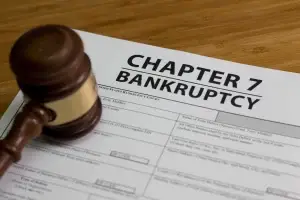Running into loads of debt is a nightmare for anyone. That sick feeling you get when reading that demand mails from creditors can cripple you as you think of all the things you stand to lose if the creditor carries out all their threats.
The good thing is that there are a few ways to manage your horrible debt situation. There’s Debt Consolidation, Chapter 13 bankruptcy filing, and Chapter 7 bankruptcy filing. In this post, we’ll focus on Chapter 7 bankruptcy, its nature, and its advantages and disadvantages.
First, what is Chapter 7 about?
Chapter 7 is a bankruptcy filing option under Title 11 of the United States Code which oversees liquidation processes. It is the most widely used type of bankruptcy in the United States and it’s available to individuals and businesses who intend liquidate or discharge unsecured debts, such as credit cards, personal loans, medical bills, deficiency balances, and judgments.
What good does it do for me 7?
Being the most commonly accepted way of filing for bankruptcy in the United States, Chapter 7 does certainly hold certain benefits for the people who need to sort out their debt situations. Some of them are:
- Quick discharge of debt: Generally, bankruptcy proceedings have a reputation for dragging out for an excruciating length of time but Chapter 7 is different. Its clear and concise provisions make it easy to go through the process and finish rapidly in the interest of both the debtor and creditor. Most cases will see the debtor’s debt discharged within three months or so. After the meeting of creditors, the trustee will file a no-asset report, and then when discharge is entered the case is closed. If it is an asset case, once the trustee appointed by the court sells off the properties not exempted from bankruptcy and payment is made to the creditors and the discharge is entered, the case will be closed.
- Absence of limit on debt amount: Another good thing about Chapter 7 is that there is no limit imposed on the debt amount. You may have debt ranging in the millions of dollars, but this doesn’t stop you from filing under this provision. It allows for the discharge of most civil judgments, including some personal injury claims.
- It stalls lawsuits and harassment by creditors: This may not be applicable in all situations because of certain exceptions made by the law, but it works in most cases. It helps to protect the debtor and his/her property against the creditor even for a while until the bankruptcy process is concluded. It stops the harassing calls and closes or prevents most court actions against the debtor.
- Conversion to other filing procedures: After commencing the bankruptcy process, the debtor is able to change the case from one under Chapter 7 to a case under Chapter 13 as long as he/she is qualified to be a debtor under the other chapter and obtains an order from the court. If you started the filing procedure under Chapter 7, but along the line, you decide that switching to a different Chapter would be best for you or is required then the debtor’s attorney must file a motion to convert and obtain a court order.
- A chance to bolster your credit: The earlier you file under Chapter 7 and take care of your debts, the better it would be for you. Carrying a debt over a long period of time can be disastrous for your credit rating. Most people do not realize this. They harbor the view that filing for bankruptcy will harm their credit and jeopardize their chances of obtaining a loan in the future. This is not true. Matter of fact, leaving your debts unattended will do more damage than good to your credit. In the beginning, you may observe a drop in your credit ratings, but they are bound to increase as time goes and you begin to practice healthy credit habits like repaying loans on time.
The drawbacks of Chapter 7 Bankruptcy:
Roses hardly come without a few thorns and the same is true with Chapter 7. Just as you are sure to make significant gains under this procedure, there are things you stand to lose. Some are:
- Loss of assets: Yes, you heard it. You could lose your most cherished assets – the ones that are not exempted. The trustee is empowered with the right to sell them off and remit the sale proceeds to your creditors. The trustee can step into the debtor shoes and assumed control of any claims the debtor has against another. If you own just one landed property, it is advisable to determine the current market value to help the debtor determine there is no other better alternative to settle your debt, or consider options such as filing for Chapter 13 bankruptcy instead. The debtor’s attorney should confirm that all your assets are exempted prior to filing Chapter 7. The debtor needs to determine the true value of their assets if sold.
- The time bar: Timing is an all-important factor under Chapter 7. The law states that after the process is complete, the filer cannot refile a fresh bankruptcy procedure under the same chapter within the next eight years. This makes it kind of dicey. How do you know it’s the perfect time to set things in motion? How can you be sure you wouldn’t need to file another one in the next few years?
Even though you can simply commit to avoiding difficult debt situations going forward, it’s something to keep in mind especially in light of the current financial disruption worldwide.
3. It doesn’t eliminate all your debt: There are certain debts not covered by Chapter 7. They include student loans, income taxes, alimony, spousal support, secured debts, and legal penalties. These cannot be written off, as a general rule but with some exceptions that you should definitely consult an experienced bankruptcy lawyer to see if you’re qualified for. Therefore, you will have to continue paying even after the procedure is completed and your assets have been disposed of to pay your creditors.
Am I better or worse off with Chapter 7?
The answer to this question will depend on the peculiarity of your situation and how prepared you are for the eventualities of filing under Chapter 7. Making the choice of putting up your property to satisfy your debts is not an easy one at all. However, it is generally a better choice to file for bankruptcy under Chapter 7 than wait for the outcome of court proceedings brought by your creditors against you. In comparison, you stand to lose a lot more in legal fees and judgment debt than with Chapter 7 bankruptcy.
You may also consider the time and effort that would be wasted should your case continue to drag on. If you’re thinking pending litigation won’t do much damage to your credit ratings, you are wrong. From experience, people who get their property foreclosed from court proceedings stand a lower chance of getting loans than those who settle their debts under Chapter 7 bankruptcy.
Chapter 7 offers you a second chance. It can be a bitter pill but it will also give you a clean slate – a chance to start afresh. In less than a year, you’ll find that most if not all your financial debts are gone and then you can breathe well again. As with all other major decisions regarding debt restructuring and bankruptcy, be sure to get the advice of bankruptcy law experts to be sure you’re taking the best available decision for your specific circumstances.
Chapter 7 will preserve your retirement accounts. Most, IRA, 401k, 403b, PSP, TESPE, and other retirement funds can be exempted in a Chapter 7 bankruptcy. Allowing the debtor to keep their retirement and discharge their debts.
About the Author: Roxane Kaye, has been practicing law since 2002. She is admitted to practice law in Michigan state courts and before the Federal Bankruptcy Court of Eastern Michigan, Southern Division, as well as the Federal District Court of the Eastern District of Michigan. Roxane covers cities such as Burton, MI, Flint, MI, Fenton, MI, Beecher, MI, Lapeer, MI, Waterford, MI, Auburn Hills, MI, Pontiac, MI, Howell, MI, Owosso, MI, Wixom, MI, Rochester, MI, Rochester Hills, MI, Novi, MI, and South Lyon, MI.
You may contact Roxane below:
Roxane M. Kaye
Kaye Law Office, PLLC
8161 S Saginaw St
Grand Blanc, MI 48439



